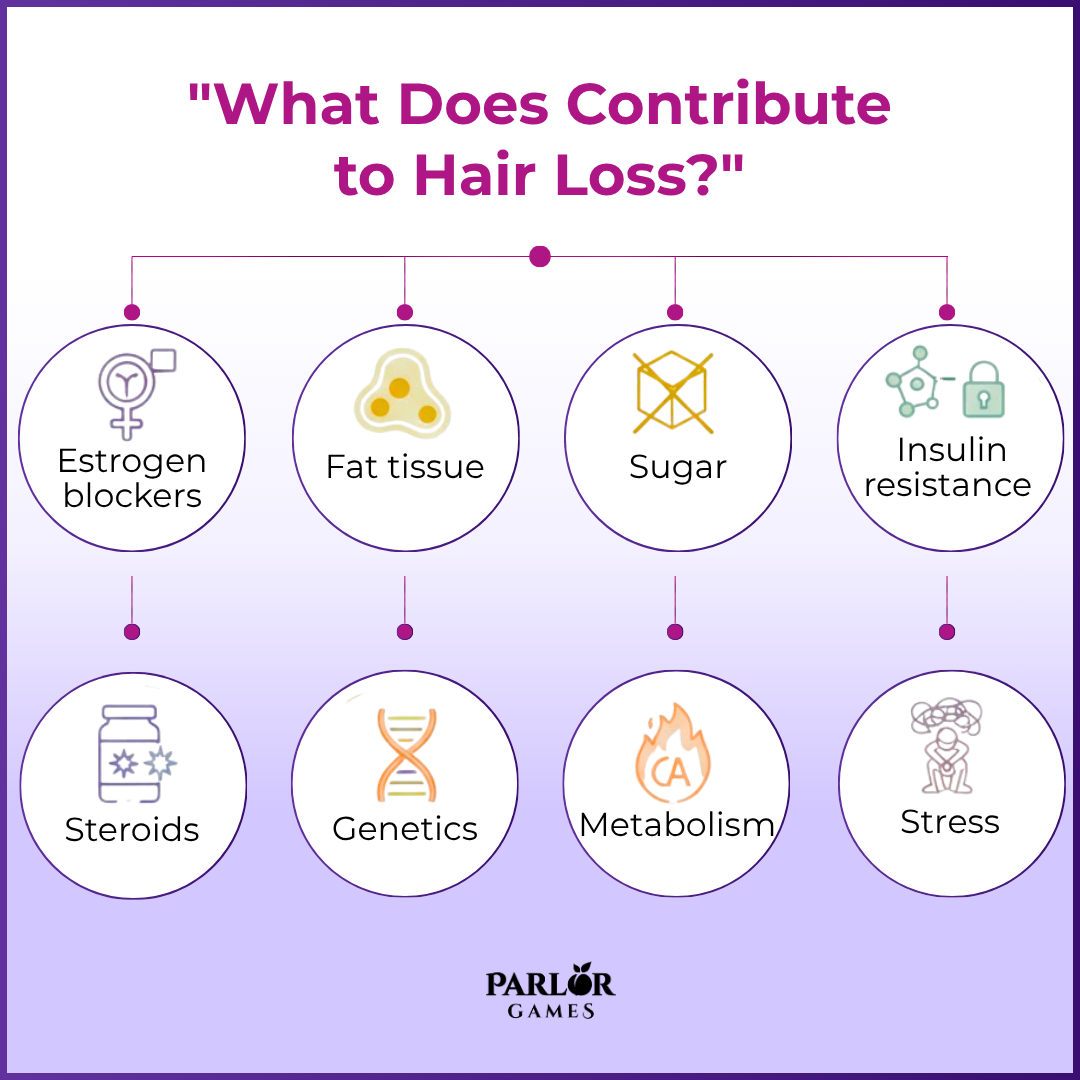CLICK TO SHOP OUR BLACK FRIDAY SALE!
*Excludes BioNude and subscriptions
Female Pattern Hair Loss (FPHL) has long been associated with menopause. Researchers have investigated the role of hormones and hair loss; while there is lots of complexity as to why women loose scalp hair at a faster rate after menopause, there is a strong link to the drop in estrogen and progesterone that occurs around menopause.
There are lots of different hormone receptors in scalp hair follicles. Let’s group those hormones into two main categories – Estrogens and Androgens. Androgens are a group of hormones that can get labeled as “male” hormones, but that’s just because men have more of these hormones compared to women. Both men and women have all the hormones, but in different amounts.

Estrogens (and progesterone) have been shown to protect women’s scalp hair follicles. Androgens have been shown to weaken the hair follicles - resulting in hair loss. While estrogen levels decline after menopause, androgens decline at a much slower rate. This means that the androgens have more of an impact on the hair follicles than they used to.
Thus, estrogen and progesterone preserve and protect our scalp hair follicles, and androgens (particularly testosterone and DHT) weaken and reduce the growth of scalp hair follicles!
Where do these Androgens come from, where are they made in the body?
The ovaries make a little bit of testosterone but not much. Most androgen hormones start as either Androstenedione or as DHEA(S) in the adrenal glands and the hair follicles. These two hormones are converted to testosterone and another hormone called Dihydrotestosterone (DHT). These are more powerful androgens, especially DHT. Testosterone and DHT will inhibit growth of the hair follicle and reduce the hair’s attachment inside the follicle.
There are many things that influence the amounts of Androgens made by the body, but when someone has a lot of these factors then androgen levels will be higher than average. This can contribute to more hair loss.

A woman who has a number of these contributing factors will very likely have an increased chance that hair will start to fall out faster than it grows after menopause.
You can hear Dr. Robyn talk about this in more depth here:
There is research which shows that both estrogen and progesterone work to strengthen the hair follicle and to promote hair growth. However, if someone has higher than usual androgens, estrogen and progesterone can only help so much. The reasons for hair loss are complicated, it is not just about changing hormones. We know food choices and lifestyle play a big role too. If hair loss continues, it’s a good idea to check in with your doctor to make sure there isn’t another factor affecting you.

Lorem ipsum dolor sit amet, consectetur adipiscing elit.
Lorem ipsum dolor sit amet, consectetur adipiscing elit.
Lorem ipsum dolor sit amet, consectetur adipiscing elit.
Lorem ipsum dolor sit amet, consectetur adipiscing elit.
Disclaimer: The information provided above is intended for educational and informational purposes only. Statements made have not been evaluated by the FDA nor are they intended to treat or diagnose. Any health concerns should be discussed and evaluated by your primary health care provider.
Parlor Games, LLC ● kate@parlor-games.com ● 5304 River Rd N Ste B ● Keizer OR 97303
Disclaimer: The information provided above is intended for educational and informational purposes only. Statements made have not been evaluated by the FDA nor are they intended to treat or diagnose. Any health concerns should be discussed and evaluated by your primary health care provider.
28 Day Challenge Subscription Details

We ship you a 28 day supply of Silky Peach Cream for only $29 (more than 25% off our normal price) when you sign up for Subscribe & Save.
Follow the directions we include in the package and apply Silky Peach cream on your tender bits for 28 days.

Decision Day:
5 days before your subscription rebills, we’ll send you an email reminder with a link. If you decide Silky Peach is nice but not your thing… you can click that link and cancel your subscription without even talking to anyone. No hassle — no questions asked.
If you are like 72% of our Silky Peach customers, you’ll love it and can't imagine life without it. In that case, do nothing, and we’ll welcome you to the Parlor Games family and ship Silky Peach Cream to your door step every month for the same discounted price of $29 — locked in for as long as you remain a subscriber.

Important note about our easy-breezy subscriptions:
We know that some companies make it hard to cancel a subscription — that’s not us. Our mission is to save the world — one vagina at a time! If you decide you don’t need Estriol as an ongoing solution for dryness, incontinence, UTIs and keeping sex fun and comfortable again, we understand. Five days before we ship your next order, you'll receive an email with a link to cancel right there in the message.
No hunting, no searching, we got you. Respect is where it’s at.
FYI – Estriol is beneficial for skin integrity and mucous membranes. It’s great for vaginal atrophy and also amazing for use on the face and neck. Applying a small amount — about 1 pump — can help build the collagen and plump up the cells to reduce wrinkles. Who knew!!
OUR HAPPINESS GUARANTEE
We want you to feel safe and confident trying any of our products. That's why we promise 100% money-back guarantee on the purchase price of the first bottle of any of our products. Balancing hormones DOES take some time, so please try it for 28 days. If after 28 days you are unhappy, or the product just hasn't worked for you, simply contact us and we'll process a refund of your full purchase price upon receipt. Sorry, shipping fees are not refundable.